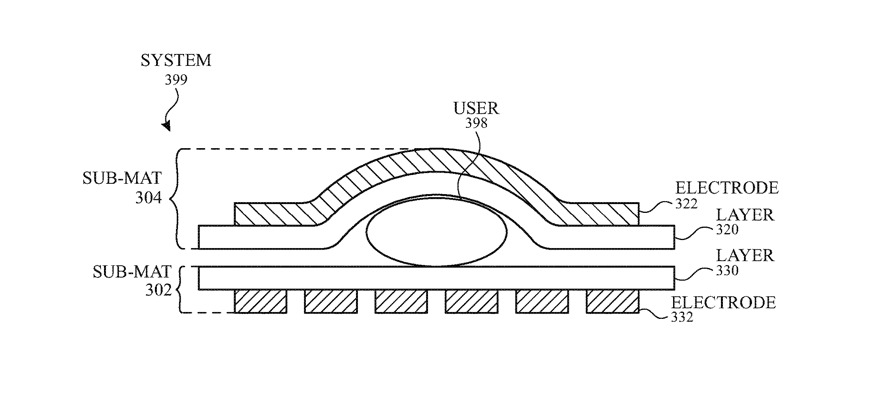Following many suggestions that Apple is bringing sleep tracking to the Apple Watch, the company appears poised to further delve into its Beddit purchase and develop bedding and blankets to monitor vital signs.
Sleep tracking has been coming to the Apple Watch for some time, and Apple even bought the Beddit third-party system for this purpose. But now a new patent suggests that the Apple Watch may not be needed as bedding and a mattress cover could be used instead.
"Traditionally, monitoring a person's sleep or vital signs has required expensive and bulky equipment," begins "Vital Signs Monitoring System," US Patent No 20200107785. It then points out that wearing such equipment makes the person uncomfortable, and so affects the very sleep patterns that it's trying to monitor.
This is specifically a criticism about the kind of sleep tracking that requires a stay in a medical facility, but it also makes points that could equally apply to an Apple Watch. Specifically, it says that currently any kind of worn device tends to be "configured to determine the vital signs based on one type of measurement or mode of operation."
What's more, an Apple Watch or any other device would monitor only the person wearing it. "[These] systems lack the capability of not only monitoring multiple users, but also incorporating the analysis of a first user into the analysis of a second user, whose sleep may be affected by the first user."
Apple's proposed solution, then, is effectively to have bedding that tracks the sleep of anyone lying on or under it. This appears to be an extension of Beddit's system, which saw a strip of material being placed under bedsheets and relaying data to an iPhone.
This extended version appears to suggest that instead of one short strip positioned under one part of a sleeping person's body, at least a larger portion of the bed would become a sensor.
"The monitoring system can include a plurality of sensors including, but not limited to, electrodes, piezoelectric sensors, temperature sensors, and accelerometers," says the patent. "Based on the measured values, the monitoring system can analyze the user's sleep, provide feedback and suggestions to the user, and/or can adjust or control the environmental conditions to improve the user's sleep."
While presumably adjusting the environmental conditions could involve data being sent to a HomeKit device to alter air conditioning, for instance, the patent refers more to providing a control system for the user. "[A] control panel can include a touch panel and/or display and be configured to interface with the user and/or a computer.... [It] can display heart rate, heart rate variability, respiratory rate, respiratory rate variability, user's motion, and user's temperature."
The mat, though, could also act as an electric underblanket and directly alter temperature itself. Apple refers to this as "active heating or cooling," and it would be more intelligent than a regular electric blanket, because it would adapt to more than one person. "[For example,] heating and/or cooling can be used to accommodate the differences in thermal comfort," it says.
So the mat would register a user's body pressing on it, and be able to distinguish between two users. The patent concentrates on very many ways that this can be done, for how it can determine "one or more physiological signals of a user," as well as of multiple users.
The invention is credited to two people at Apple, Shahrooz Shahparnia and Erno H. Klaassen. Both researchers hold multiple patents, but none clearly related to this.
 William Gallagher
William Gallagher







-m.jpg)






 Thomas Sibilly
Thomas Sibilly
 Wesley Hilliard
Wesley Hilliard
 Marko Zivkovic
Marko Zivkovic

 Malcolm Owen
Malcolm Owen

 Amber Neely
Amber Neely








20 Comments
Outside of a tiny number of people with particular medical conditions I do not see the point of sleep monitoring. I know if I got a good night's sleep or not. I know if I slept on my arm wrong. I know if I tossed and turned. I don't need an app for that.
I wonder if something like this could be used for alerting someone to sleep apnea. Or even somehow communicating with a CPAP.
Having gone for a sleep test, it is harrowing if you don't sleep the way they want you to with all those things hooked up to your head.
I could not sleep on my back the way I was told I had to and spent the whole night pretty much awake. Results inconclusive.
I sincerely believe that the root cause of most sleep issues is anxiety and stress. Yes, sleep apnea is a real thing, which I know about firsthand, but many (most?) cases of obstructive sleep apnea are closely related to over eating, excessive alcohol consumption, and a general reduction in physical activity and a resultant poor physical condition. The 24-hour news cycle, constant stream of media coverage, including individually generated media sources like Twitter, corrosive oneupmanship, marginalization, us-vs-them, and everything being a zero-sum game has taken its toll on individuals. Yes, nastiness and incivility has always existed, but it has gotten much worse, and with our inability to wean ourselves off of our connected devices means that it’s now in our face 24 hours a day every day of our lives.